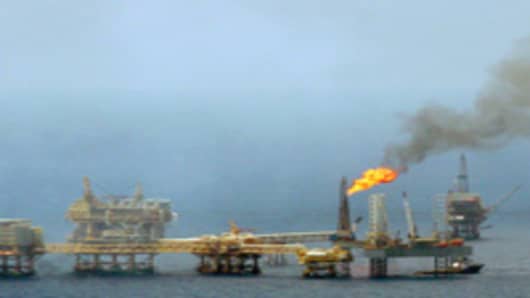The price of oil has been very volatile in recent weeks but one investor believes over the medium term there are good reasons for crude prices to remain above $100 a barrel.
"As an investor, this volatility can be difficult to handle. Throw in the uncertainty of today’s geopolitical environment, and investors feel the need to downsize their positions in commodity investments, such as oil ," said Frank Holmes, the chief investment officer at US Global Investors, in a note sent to CNBC.com.
Whilst prices are likely to remain volatile, Holmes said a weak dollar, emerging market demand and political uncertainty will help support prices at and above $100.
Despite recent strength Holmes is bearish on the medium-term prospects for the dollar.
"We think these are short-term drivers and don’t accurately reflect the long-term headwinds facing the dollar. I’ve discussed these often and in an attempt to keep this note brief, I’ll let the following picture tell the story.
"Even if Washington decided on a comprehensive plan to fix entitlement overspending, trim defense spending and reduce the US deficit today, it would take years to see any meaningful shift (in US debt levels)," said Holmes.
“We feel the recent uptrend in the US dollar is a short-term reprieve from a long-term downtrend,” he said.
Emerging market demand remains a major factor and whilst the IEA see softness in the global market Holmes believes demand continues to rise.
"The 1.3 million barrels of demand growth that is expected for 2011 is less than last year, but is more along the lines with historical rates and maintains the forward momentum for rising oil demand," he said.
With geopolitics playing a big role in driving oil to $100, some in the market are questioning whether the risk premium is still valid given signs the middle-east crisis has not spread to Saudi Arabia.
"As much as 80 percent of the world’s oil reserves lie beneath these shaky regions. Civil wars and attacks on oil facilities can create production slowdowns or even shut down production entirely," said Holmes.
"The conflict in Libya and unrest in several other Middle East countries shows just how quickly this can affect global oil markets. Iraq is another example of the difficulties inherent in production expansion in these regions," he said.
"Last week, the country’s former oil minister said it would only be able to meet half of its stated production goal by 2017. The original forecast, clearly a lofty one, called for roughly 12 million barrels per day in oil production," said Holmes.



